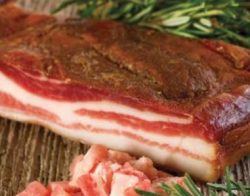Pass the Bacon, Please
Fats have taken on new importance as a superfood.
 Still scarred by the nutritional nonsense of the “No-Fat ’90s?” Thankfully, it’s the 21st century and eating fat is where it’s at!
Still scarred by the nutritional nonsense of the “No-Fat ’90s?” Thankfully, it’s the 21st century and eating fat is where it’s at!
Healthy fats are the new superfood — and nutritionists say fats can impact your body and health in a multitude of positive ways.
Did you know?
· A 1997 Framingham Heart Study showed that heart disease began to rise as people started replacing butter with margarine.
· A 2000 New England Journal of Medicine study links the beginning of the obesity epidemic with the reduction of red meat and high-fat dairy products.
· The World Health Organization reports that at the beginning of the fat-free craze, 14 percent of adults were obese. Today, more than 39 percent of adults are classified as obese and 1.9 billion are overweight.
If you’ve been avoiding fat because you’re afraid of getting fat, you might actually be sabotaging your diet and your health. The science has switched in favor of actually consuming the fats we’ve been told to fear — even the big no-go’s like butter, eggs and — cue the hallelujah chorus — bacon.
Why in the world would I eat that?
Healthy fats help you feel fuller.
Healthy fats can often be found in high-protein foods, a smarter fuel source for your body and its critical organs.
Fats help curb the sugar cravings you get when your stomach is empty.
Probably the most compelling reason to pick healthy fats instead of low or fat-free choices is because foods that manufacture the fat out typically have to add something else in to make up for the loss. Those additives include sugars, salts, heart-clogging trans-fats or artificial ingredients.
Recent research from Purdue University shows that our taste buds can detect fat in food, helping explain why low-fat foods don’t curb our fat cravings or appetite. Researchers believe fat may be an entirely different basic taste than the four mainstays: sweet, salty, sour and bitter.
What can healthy fats do for you?
Fat stimulates fat-burning: A 2009 study in the British Journal of Nutrition found that participants who consumed the most unsaturated fatty acids have lower body-mass indexes and less abdominal fat than those who consumed the least. Adequate fat supports metabolism, cell signaling, reduced inflammation and hormone production — all part of the fat-loss big-picture.
Fat does a body good: Good fats boosts the brain and protects cell membranes. Fats have been shown to help regulate glucose and insulin levels. Not only that, but without fat, the body is inefficient at absorbing many nutrients, especially vitamins A and D, which are needed for optimal health and immune system function.
Fat is a beauty booster, too: Think about it — major signs of anorexia nervosa (a disease caused by an excessively low-fat and calorie diet) are brittle nails and hair, and bad skin. High-quality fats and those containing omega-3 fatty acids (like fish oil) boost skin hydration, help prevent wrinkles and aging, and even give you a healthy glow to boot.
So, what’s on your menu tonight?
There’s no such thing as a free lunch, and the all-night greasy burger joint is not the place to find healthy fats. When deciding which fats are best:
1. Analyze how “whole” the fats are — how much processing have they gone through and what has been added to them? (The more basic, the better.)
2. If the food is labeled, verify there are no trans-fats or hydrogenated oils.
3. Be aware that fat is still fat and not meant to be consumed in massive quantities (we’re looking at you fried food … even food fried in olive oil and coconut oil should be consumed in moderation).
Basic Healthy Fats
Monounsaturated fatty acids are found in vegetable oils (especially olive oil), nuts, nut butters, seeds, olives and avocados.
Polyunsaturated fatty acids include fish and seafood, which both offer the bonus of essential fatty acids (omega-3s fatty acids especially). Salmon and tuna are popular and easy to obtain.
Saturated fatty acids are found in meat, eggs and full-fat dairy products, like butter and cheese. Certain vegetable oils such as coconut, palm kernel and palm oil also contain saturated fat.
One of the drivers of the low-fat craze was the research showing saturated fat raised LDL (bad) cholesterol levels. But a re-evaluation of the data tells us that these fats raise HDL (good) cholesterol in equal, if not greater, measure, thus protecting the heart.
So pile up your salad plate with nutrient-rich spinach, tomatoes and carrots, and don’t be afraid of topping it off with a handful of nuts, chopped hard-boiled egg and some olive oil for a meal that really satisfies. And on the weekend? Pass the bacon!
